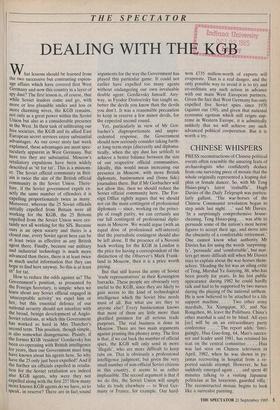CHINESE WHISPERS
PRESS reconstructions of Chinese political events often resemble the amazing feats of archaeologists who confidently deduce from one surviving piece of mosaic that the whole originally represented a leaping dol- phin or female dancer. So, with Mr Teng Hsiao-ping's latest 'reshuffle', Hugh Davies of the Daily Telegraph was particu- larly gallant. `The war-horses of the Chinese Communist revolution began to step aside last night. . .' said Mr Davies. `In a surprisingly comprehensive house- cleaning, Teng Hsiao-ping. . . was able to persuade some of the nation's most heroic figures to accept their age, and move into the obscurity of a comfortable retirement.' One cannot know what authority Mr Davies has for using the words 'surprising- ly', 'persuade' and 'comfortable', but mat- ters get more difficult still when Mr Davies tries to explain about the war-horses them- selves: 'Heading the list was an ailing critic of Teng, Marshal Ye Jianying, 88, who has been poorly for years. In his last public appearance during 1982 he could hardly talk and had to be supported by two nurses during the playing of the national anthem. He is now believed to be attached to a life support machine. . . . Two other army marshals, Xu Xiangqian, 83, and Nie Rongzhen, 86, leave the Politburo. China's other marshal is said to be blind. All eyes [sic] will be on an extraordinary party conference . . .' The report adds: 'Intri- guingly, Hua Guo-feng, 64, Mao's succes- sor and leader until 1981, has retained his
seat on the central committee . Hua was last seen on Chinese television in April, 1982, when he was shown in py- jamas recovering in hospital from a re- ported suicide attempt. However, he has suddenly emerged again . . . and spent 40 minutes talking to a visiting Japanese politician at his luxurious, guarded villa.' The reconstructed mosaic begins to look like a surrealist painting.














































 Previous page
Previous page